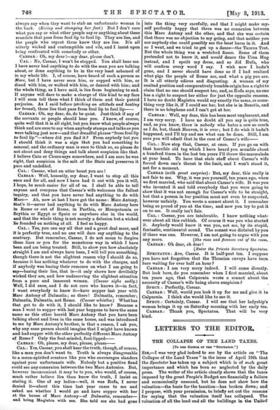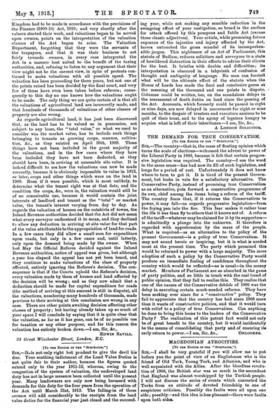LETTERS TO THE EDITOR.
THE COLLAPSE OF THE LAND TA XTIS. [To THE EDITOR Or THE " SPECTATOE."] Sri,—I was very glad indeed to see by the article on " The Collapse of the Land Taxes" in the issue of April 19th that the Spectator has taken up a subject which is of such great importance and which has been so neglected by the daily press. The writer of the article clearly shows that the taxes imposed by the great People's Budget are financially a failure and economically unsound, but he does not show how the valuation—the basis for the taxation—has broken down; and I propose, with your permission, to briefly set out the reasons' for saying that the valuation itself has collapsed. The valuation of all the land and all the buildings in the United
Kingdom had to be made in accordance with the provisions of the Finance (1909-10) Act, 1910; and very shortly after the valuers started their work, and valuations began to be served upon owners, points on the interpretation of the valuation clauses of the Act began to arise. The Valuation Department, forgetting that they were the servants of the taxpayers, and that it was their business to act fairly towards owners, in every case interpreted the Act in a manner best suited to the benefit of the taxing authorities, and, refusing to listen to any argument that their view might not be the correct view, in spite of protests con- tinued to make valuations with all possible speed. The valuation has been proceeding for three years, but not one of the points raised has been decided by the final court, and very few of them have even been taken before referees ; conse- quently to this day no one knows how the valuations ought to be made. The only thing we are quite certain of is that all the valuations of agricultural land are incorrectly made, and that hundreds of thousands of valuations of other classes of property are also wrong.
As regards agricultural land, it has just been discovered that, as the land has to be valued as in possession, not subject to any lease, the "total value," or what we used to consider was the market value, has to include such things belonging to tenants as growing crops, manure, cultiva- tion, &e., as they existed on April 30th, 1909. These things have not been included in the great majority of the valuations, and in the few cases where they have been included they have not been deducted, as they should have been, in arriving at assessable site value. It is indeed difficult to see how the valuations can now be made correctly, because it is obviously impossible to value in 1913, or later, crops and other things which were on the land in 1909. Even if it were possible, which is most unlikely, to determine what the tenant right was at that date, and the condition the crops, &c., were in, the valuation would still be of no conceivable use, because it would contain the joint interests of landlord and tenant as the " total " or market value, the tenant's interest varying from day to day. As regards the valuation of houses on the outskirts of towns, the Inland Revenue authorities decided that the Act did not mean what every surveyor understood it to mean, and they declined t) allow any deduction in arriving at site value for that part of the value attributable to the appropriation of land for roads. In a few cases they did allow a small sum for expenditure upon roads, but only in a few cases and, until latterly, only upon the demand being made by the owner. When last May the Official Referee decided against the Inland Revenue authorities, notice of appeal was given, but although a year has elapsed the appeal has not yet been heard, and they continue to make valuations of the class of property affected, entirely ignoring the Referee's decision. The con- sequence is that if the Courts uphold the Referee's decision, every valuation made by them of houses and land affected by the decision will be wrong ; and as they now admit that a deduction should be made for capital expenditure for roads (the method of arriving at this amount is still in dispute), all the valuations, numbering many hundreds of thousands, made previous to their arriving at this conclusion are wrong in any case. There are other points awaiting decision affecting other classes of property; but having already taken up so much of your space I will conclude by saying that it is quite clear that the valuation, as far as it has gone, can be of no possible use for taxation or any other purpose, and for this reason the valuation has entirely broken down.—I am, Sir, &c.,



















































 Previous page
Previous page